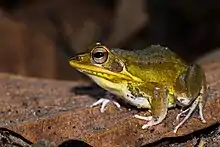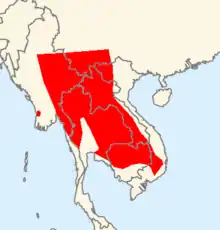Humerana lateralis
Humerana lateralis is a species of frog in the family Ranidae. It is found in Cambodia, Laos, Myanmar, Thailand, and Vietnam. It is commonly known as Kokarit frog, yellow frog or (ambiguously) wood frog.[2][3]
| Kokarit frog | |
|---|---|
 | |
| In Huai Kha Khaeng Wildlife Sanctuary, Thailand | |
| Scientific classification | |
| Domain: | Eukaryota |
| Kingdom: | Animalia |
| Phylum: | Chordata |
| Class: | Amphibia |
| Order: | Anura |
| Family: | Ranidae |
| Genus: | Humerana |
| Species: | H. lateralis |
| Binomial name | |
| Humerana lateralis (Boulenger, 1887) | |
 | |
| Synonyms | |
| |
Placed in Rana when this was still loosely circumscribed, it was since assigned to the "water frog" genus Pelophylax. However, it is not clear whether this is the most appropriate treatment, and the Kokarit frog might rather belong in Hylarana. In 2015, it was classified into Humerana based on phylogenetic evidence.[4] The supposed species Rana nigrolineata was recently determined to be a junior synonym of H. lateralis.[5][2]
Habitat
Its natural habitats are subtropical or tropical dry forest, subtropical or tropical moist lowland forest, subtropical or tropical dry lowland grassland, moist shrubland, plantations, swamps, freshwater marshes, intermittent freshwater marshes, ponds, and seasonally flooded or irrigated agricultural land. It is not considered threatened by the IUCN.[2]
Consumption
In parts of Cambodia north and east of the Mekong River, it is collected for human consumption in localities such as Snuol District, Kratie Province.[6]
Footnotes
- Frost, Darrel R. (2013). "Hylarana lateralis (Boulenger, 1887)". Amphibian Species of the World 5.6, an Online Reference. American Museum of Natural History. Retrieved 17 June 2013.
- van Dijk et al. 2011
- "Humerana lateralis (Boulenger, 1887) | Amphibian Species of the World". amphibiansoftheworld.amnh.org. Retrieved 2022-08-08.
- Grosjean, Stéphane (October 2015). "Corrigendum to: "Improving biodiversity assessment of anuran amphibians using DNA barcoding of tadpoles. Case studies from Southeast Asia" [C. R. Biologies 338 (2015) 351–361]". Comptes Rendus Biologies. 338 (10): 708. doi:10.1016/j.crvi.2015.06.001. ISSN 1631-0691.
- Stuart 2008
- An Investigation into Frog Consumption and Trade in Cambodia
References
- van Dijk, P.P.; Stuart, B.; Datong, Yang; Shunqing, Lu (2011). "Pelophylax lateralis". IUCN Red List of Threatened Species. 2011. Retrieved 30 August 2011.
- Stuart, Bryan L. (2008). "The phylogenetic problem of Huia (Amphibia: Ranidae)" (PDF). Molecular Phylogenetics and Evolution. 46 (1): 49–60. doi:10.1016/j.ympev.2007.09.016. PMID 18042407. Archived from the original (PDF) on 2016-03-03. Retrieved 2011-08-30.
